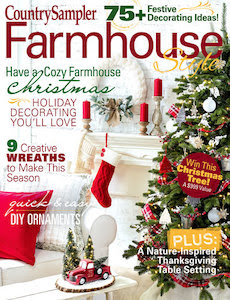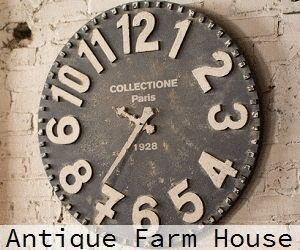Ever wish you had a pretty collection of vintage transferware? Years ago that was me. But with thrifting, anything is possible!
Last fall I introduced you to my growing brown transferware collection (along with a few other red transferware pieces). This fall I'm pleased to share my growing red transferware collection! And here's the secret: the pieces don't have to match to make a stunning display!
My fledgling vintage red transferware collection is a mish mosh of plates, saucers and bowls.
But they all look beautiful displayed in my vintage chicken feeder.
The patterns don't necessarily match, but the display's overall look is still quite cohesive.
I purchased this small saucer in Spode's Tower pattern at Salvation Army for $1.97. It has a small chip on the rim, but that adds to the charm in my book.
According to the handy AI Overview:
Spode's Tower is a famous and long-running transferware pattern, first produced by Spode around 1814 from illustrations in "Views of Rome and its Vicinity". The pattern features a central bridge and tower design and has been produced in a variety of colors, most notably a dark blue and a popular pink version, made exclusively for the North American market beginning in 1923. The pattern, including the pink color, continued in production until the Copeland {England} Spode factory closed in 2009.
One of my daughters gifted me two red transferware small plates, and what I love about these plates is that they depict two swans gliding on a pond. I am totally in love with swans and have never seen this pattern before!
The maker's mark says Homer Laughlin Made in USA B 42 N 6. Interestingly, the first letter (B) and number (42) represent the corresponding month and year the plate was made. So this plate was made in February of 1942.
The second letter (N) and number (6) represents the location where the plate was made. In this case it stands for Newell, West Virginia, plant number 6.
I fell in love with this plate as soon as I saw it. The lovely pink floral pattern is known as Salisbury Pink.
While I only paid $2.99 at Goodwill for this Historical America Homer Laughlin red transferware dinner plate, it's currently for sale on Replacements.com for $49.99.
It's a Joseph Boggs Beale reproduction painting of General Washington taking command of the army in 1775.
Another $2.99 Goodwill purchase, this plate is listed on eBay and other sites for between $7.00 and $25.00
Living in the Chicago suburbs, it makes this plate that much more interesting to me. It depicts the infamous Michigan Avenue in downtown Chicago, Illinois. While not produced by Homer Laughlin, this Historic America red transferware plate was made by Johnson Brothers in England.
I got this James Kent red transferware bud vase from a local church thrift store, along with the saucer, for $12. A bit pricey for my taste, but I loved it and the money went to a good cause.
Its makers mark says Genuine Hand Engraving Old Foley James Kent Staffordshire England. Unfortunately, I haven't been able to figure out what year it was made in.
I picked up this ironstone pink transferware plate for $1.99 at Goodwill. It depicts Kenilworth Castle in 1792. The pattern is called Old Britain Castles Pink.
The discontinued pattern was made by Johnson Brothers in England from 1930 to 2003.

While not depicted in the plate rack display, I also have this red transferware demitasse cup and saucer displayed here with my Vintage-Inspired Farmhouse Plate Rack and Brown Transferware Display. I got them for 99 cents each at Goodwill. The cup says "Made in England" on the bottom, however, I can't read the makers mark on the bottom of the saucer. Their patterns don't even match, but I think they look perfect together!

And lastly, as part of the above display, I added my red transferware sugar bowl and creamer along with the brown transferware teapot. The set was made by Villeroy & Boch in West Germany between 1964 and 2001. You can read about their provenance in Thrill of the Hunt #137.
I even have a red transferware large porcelain pitcher and casserole dish packed away somewhere in the basement (and hope to find them in time to display for Christmas).
While some transferware makers name their wares "pink," and others name them "red," both can be combined to form an eclectic collection, yet still look quite cohesive. Equally appropriate for both fall and winter displays (especially Christmas time), I'm looking forward to displaying them for months to come.
Well, that's it for today, friends!
I hope you've enjoyed reading about my




















.png)











Leave a Comment!
I love your red Transferware. You always find the best stuff. I could not see some of your pictures. Not sure if that is on my end or yours. Have a good week. Hugs. Kris
Love that you researched these. I know I pick up anything in pink or red to sell and they disappear quickly. You have some Lovelies, enjoy! Sandi
Thanks, Kris. I agree -- the thrifting gods have been good to me:) As of right now I can see all my pictures in the post. Thanks for the heads up, appreciate it! xo Kathleen
Post a Comment